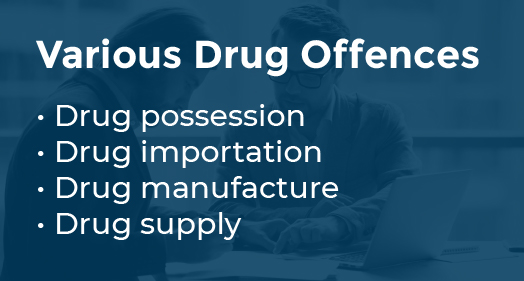
NEWS
The Cost of Breaking the Law: A Look at Drug Penalties in NSW
The use of drugs has been around in human history for thousands of years, and Australia, including NSW, is no exception. In the late 1900’s, the use of drugs such as opium, cannabis and cocaine proved to be very prevalent in Australia. However, in the early 2000’s, the Australian government started to crack down on drug use and started to manage and prohibit drugs. Regardless of these actions committed by the government, drug use and drug-related crimes continued to increase, resulting in more strict laws and penalties arising within NSW.

Drug Possession
Falling under section 10 of the Drug Misuse and Trafficking Act 1985 (NSW), the possession of drugs is a criminal offence. Being in possession of an illegal drug or substance in NSW means that you are deemed at fault and hence are in breach of this act.
Even though the term “possess” alludes to on-person possession, it is crucial to have an understanding that one may still be charged with the possession of drugs in NSW even if the drugs are found in the individual’s car, for example. There are numerous forms of possession, and although you may not feel as though you have breached any laws, you very well could be.
Penalties
If you are found guilty of drug possession, you can face up to a maximum of 2 years imprisonment and/or fined up to $2200. In NSW, the most consequential penalty is imprisonment; however, supplementary penalties can be appointed, such as an intensive corrections order (ICO), a conditional release order, or a community corrections order. It is under the discretion of the court as to whether they decide to impose such penalties in conjunction with or instead of imprisonment.
For first-time offenders, first-time drug possession charges in NSW are generally confronted with less stringent penalties compared to those who have committed this offence more than once.
Drug Importation
Section 307 of the Commonwealth Criminal Code 1995 states that importing border-controlled drugs is a federal offence. This code characterises drug importation as an individual who imports or exports a substance where the substance is a border-controlled drug or plant.
Courts take this type of offence very seriously, which is why it is very important that you obtain guidance and advice as soon as possible from a reputable team of criminal defence lawyers.
Penalties
As one of the most serious offences related to all drug charges, the Australian Courts instil some of the highest penalties for drug importation offences. The Australian Federal Prosecution Service, or the CDPP (Commonwealth Director of Public Prosecutions), declares the following maximum penalties for the following drug offence – drug importation:
- Importing Commercial Quantity of Border-Controlled Drugs: Life Imprisonment
- Importing Marketable Quantities of Border-Controlled Drugs: 25 years Imprisonment
- Importing Border-Controlled Drugs: 10 Years Imprisonment
Drug Manufacture
According to the Drug Misuse and Trafficking Act 1985 (NSW), the manufacturing of prohibited drugs is a criminal offence. A drug manufacture offence refers to an individual who manufactures or produces, or intentionally manufactures or produces substances that are stated under Schedule 1 of drugs in Australia.
To be found guilty of such drug offences, the prosecution must prove beyond reasonable doubt that the accused was, in fact, manufacturing or producing illegal drugs. The prosecution must also prove that the offender knowingly produced or even assisted in producing an illegal substance under Schedule 1 of the Drug Misuse and Trafficking Act 1985 (NSW).
Penalties
The drug sentencing and penalties that are imposed on guilty offenders of drug manufacture greatly depend on the quantity of the illegal substance that is found. The outcomes presented will also depend on extenuating circumstances, such as the offender’s criminal history. In addition, the Court will take into consideration the quantity of the drug, the methods of manufacture, any financial gains, the offender’s role, as well as if there were multiple people involved in the crime.
- Small Quantity: $5,500 fine and/or 2 years Imprisonment
- Indictable Quantity: $220,000 fine and/or 15 years Imprisonment
- Commercial Quantity: $385,000 fine and/or 20 years Imprisonment – a non-parole period of 10 years also applies
- Large Quantity: $550,000 fine and/or Life Imprisonment – a non-parole period of 15 years also applies
Drug Supply
The supply of drugs is defined as an individual who supplies or deliberately takes part in the act of supplying an illicit substance. Drug charges in NSW for the supply of drugs can vary depending on the certain substance supplied as well as the quantity that is discovered by the police.
To be found guilty of drug supply, the prosecution must prove beyond reasonable doubt that one was involved in the selling and distribution of drugs, agreed to supply or offer illegal drugs, and also was in possession of drugs for supply. One may be charged if it can be proved that sending, forwarding, delivering, receiving or directing the supply of drugs occurred.
Penalties
The penalties that are imposed on an individual found guilty of the supply of drugs vary depending on the quantity found. In order to also determine the appropriate sentence, the Court will take into consideration the offender’s past criminal history and circumstances surrounding the charge.
- Trafficable Quantity: $11,000 and/or 2 years Imprisonment
- Indictable Quantity: $220,000 and/or 15 years Imprisonment
- Commercial Quantity: $385,000 and/or 20 years Imprisonment
- Large Commercial Quantity: $550,000 and/or Life Imprisonment
In certain circumstances, the Court may impose other penalties such as good behaviour bonds, community service orders, periodic detention or suspended sentences.

